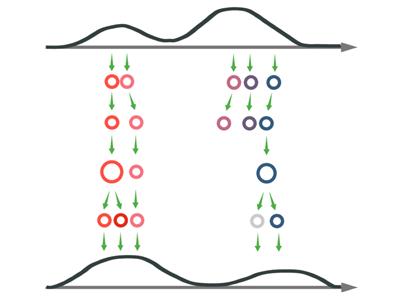Statistical filtering introduced to enhance the design of new drugs

Researchers at the University of Southampton are applying a statistical approach to molecular simulations that could transform the discovery of new molecules and materials.
The enhanced sampling tool, known as Sequential Monte Carlo (SMC), could overcome limitations in conventional simulations to improve the design of new drugs.
Professor Jonathan Essex, Head of Chemistry, has received funding from the Engineering and Physical Sciences Research Council (EPSRC) to investigate whether the statistical method can deliver reliable, efficient, and generalisable enhanced sampling to any molecular simulation.
In a molecular simulation, atoms move in a system in response to the energy and forces acting on them. By examining changes in the molecular arrangements, scientists can develop and design new optimised molecules which feed into the drug design process.
For example, by exploring how a drug binds to its receptor in the human body, known as its ‘binding geometry’, new interactions may be identified and exploited, leading to better drugs with higher affinity or better selectivity.
The extent to which current molecular simulations can explore the binding geometry is however very limited.
Professor Essex says: “This new project seeks to solve the sampling problem, by developing and applying a widely used sampling procedure from statistics - Sequential Monte Carlo. This approach will be general and adaptable. In doing so this high-risk project will deliver robust new molecular simulation methodology to transform the discovery of new molecules and materials.”
Conventional simulations are very efficient at sampling a particular binding geometry, but there are large energy barriers separating other possible binding geometries, meaning that these are seldom observed in the simulations, if at all.
There are a range of enhanced sampling algorithms, which seek to solve this problem of poor sampling. However, they all suffer from disadvantages that make them inefficient and requiring considerable system-specific optimisation.
Some studies are able to overcome the limitations by turning to high-performance computing but the solution represents a massive financial investment that is beyond the capability of the overwhelming majority of scientists.
The Southampton approach will overcome the challenges by working smarter. Molecular-SMC is adaptive, efficient and reduces the need to know the detailed structure of protein-ligand systems.
The new research will be applied to two pressing problems in drug discovery; in protein-ligand docking, with a particular focus on the problem of variable hydration; and in the more rigorous area of binding free energy calculations, where subtle modifications to the ligand can bring about substantial changes in binding geometry.
Professor Essex is one of three academics from the University of Southampton awarded a total of £600,000 from the EPSRC New Horizons call. The programme is aimed at high-risk discovery research focused on advancing knowledge and securing the pipeline of next-generation innovations.
Dr Luca Sapienza, Associate Professor of Physics, is investigating some of the more complex unanswered questions around photosynthesis, while Dr Alain Zemkoho, Associate Professor in the School of Mathematics, is exploring ‘pessimistic bilevel optimisation’ problems between various engineering, economic and human systems.